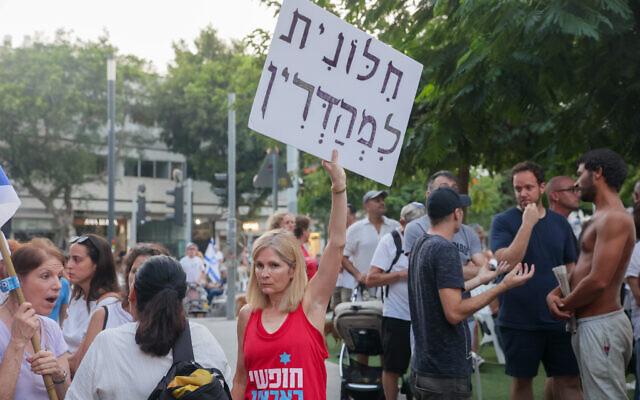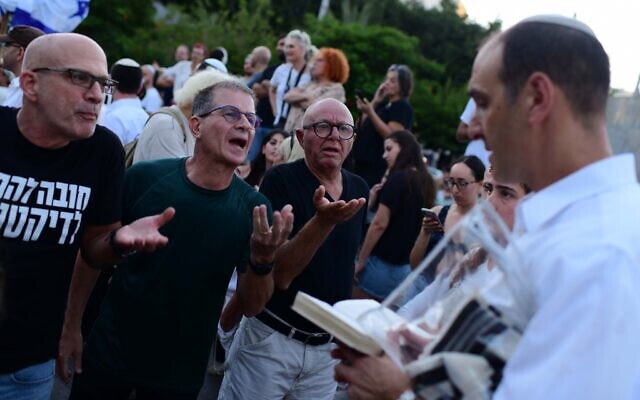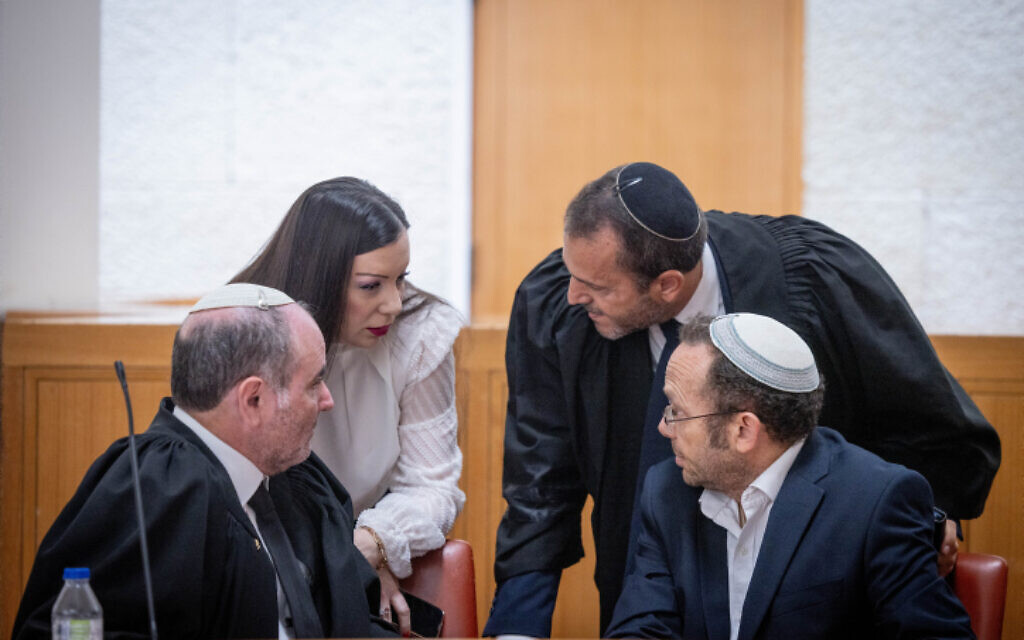The Tel Aviv Municipality on Friday acquiesced to a demand by a controversial Jewish Orthodox group to hold Sukkot and Simhat Torah events in central Tel Aviv over the weekend, after the High Court of Justice criticized the city’s conduct on the matter and urged the sides to reach a compromise.
The municipality and Rosh Yehudi subsequently agreed that the event would go forward Saturday without physical barriers between men and women, and with the only segregation being voluntary. It will not be held at Dizengoff Square but near it.
Simhat Torah marks the end of the previous year’s cycle of Bible readings and the start of a new cycle, and is celebrated by Orthodox Jews with sex-segregated folk dances while holding Torah scrolls. Known as Second Hakafot, Saturday’s event is a traditional celebration held immediately following Simchat Torah to show solidarity with Diaspora Jews, who mark the holiday a day after Jews in Israel.
The conservative religious organization entered into a dispute with the municipality over clashes at a previous religious event last month for Yom Kippur. That event provoked uproar across Israel’s polarized society.
The city had previously said it had revoked Rosh Yehudi’s permit to hold this weekend’s event because it had violated the terms of a permit the city had given it ahead of the September 24 event for Yom Kippur. For this reason, the municipality said, it did not have confidence that Rosh Yehudi would respect city regulations at the Simhat Torah event, scheduled to take place on Saturday.
But High Court judges signaled to the municipality throughout Friday’s hearing that they did not view this consideration as sufficient to justify the limitation on freedom of worship.
On Yom Kippur, Rosh Yehudi placed a bamboo frame with flags hanging down from the top section and used it as a mechitza, a divider between men and women, which is a requirement of Orthodox Jewish law for prayers.

People pray while activists protest against gender segregation in the public space during a public prayer on Dizengoff Square in Tel Aviv, on Yom Kippur, the Day of Atonement, September 25, 2023. The sign reads ‘Strictly secular.’ ( Itai Ron/Flash90)
Rosh Yehudi, which openly encourages Jews to lead more Orthodox lifestyles, said that the traversable divider did not violate the terms of the permit, which forbade placing barriers between the sexes. Police authorized the divider but the city said it was a violation of its ban on a barrier between the sexes, which the city said was discriminatory.
Local seculars took apart the frame on September 24 and disrupted the prayers, which Rosh Yehudi had been holding annually in Dizengoff Square since 2020. This year was the first time the city introduced the anti-divider stipulation. Secular activists disrupted a second prayer on September 25, although it featured no dividers.
Prime Minister Benjamin Netanyahu and many other politicians condemned the seculars’ actions. Opposition Leader Yair Lapid said residents were justified in being upset by the group’s actions but that the scenes on display in Dizengoff Square “must not repeat themselves.”
Many view the pushback by seculars and activism against elements of Orthodox Jewish behavior as connected to the conservative push by Netanyahu’s government, which comprises his Likud party and five religious parties.
Secular activists describe a sense of creeping religious coercion in various aspects of public life, and viewed the mass prayer in a square at the heart of Tel Aviv, the bastion of Israeli secularism, as an attempt to increase religious influence in the public space. The organization behind the event, Rosh Yehudi, has made no secret of its efforts to bring secular Israelis closer to religion.

Activists opposed to a gender-separated public prayer event confront worshippers in Dizengoff Square, Tel Aviv, on Yom Kippur eve. September 24, 2023. (Tomer Neuberg/Flash 90)
Supporters of the group have bristled at the effort to limit freedom of religious worship in the city, with some even characterizing the opposition to the prayer services as a form of antisemitism.
The High Court hearing was held after a Tel Aviv court affirmed on Wednesday evening the municipality’s right to revoke the permit. That ruling followed an unsuccessful arbitration process between the municipality and Rosh Yehudi.
Israel Zeira, the founder of Rosh Yehudi, told reporters at the District Court on Wednesday: “We’re not ashamed of what we want: We want the People of Israel to become religious. Promoting the Torah is legitimate and we’re doing it without an ounce of coercion or provocation, we’ve never hidden it.”
On Friday the organization said: “Let there be no doubt, we will act according to law. But a law preventing dividers between men and women is an immoral law and is destined to disappear. This is a conceited law that attempts to make decisions for faithful people regarding their faith. It attempts to reeducate the ‘outdated religious’ in the enlightened views of the progressive religion. We will never allow laws that contradict the Torah to be forced upon us.”
Fresh controversy at Dizengoff Square
Thursday saw new outrage erupt as Prime Minister Benjamin Netanyahu joined numerous right-wing politicians in decrying an ostensible violent incident at a public prayer service in Tel Aviv. At the same time, both parties involved in the incident said there had been no violence at all.
A widely circulated video had shown a man bumping into Rabbi Leo Dee at the service as he quickly walked away from the scene. Dee’s wife and two daughters were murdered by Palestinian terrorists earlier this year. The clip raised a storm on social media, where many users — mostly government supporters — as well as members of the coalition, denounced the act as an appalling example of violence against Jewish worship.
Dee and the man who ran into him, Michael Sfard, soon offered a wholly different version of events, however, with the former insisting there had been no violence and the latter saying he was merely clumsily attempting to escape a nearby confrontation.
התיעוד בו נראה ליאו די, שאשתו ושתי בנותיו נרצחו בפיגוע הירי בבקעה נדחף על ידי מפגין בכיכר דיזנגוף, רק בגלל שהעז להתפלל ולהחזיק ארבעת המינים ברחובה של עיר הוא מזעזע ומטריד. אני מגנה את זה בכל תוקף. הנחתי את המשטרה לפעול באופן נחוש נגד אותם פורעים בדיוק כמו שעצרו את היורקים אתמול… pic.twitter.com/zLpD2q9jZa
— איתמר בן גביר (@itamarbengvir) October 5, 2023
The incident underscored the heightened national tensions and the power of images to fuel narratives in the current highly conflicted and volatile national atmosphere — even when those images are taken out of context.
Canaan Lidor contributed to this report.





